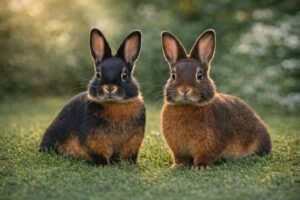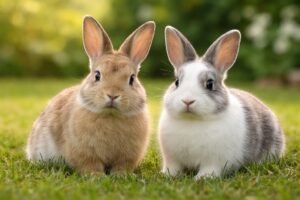Do you know what not to feed a pet rabbit? Some foods can be very harmful. In this article, you’ll learn about specific foods to avoid to keep your rabbit healthy.
Key Takeaways
- Certain vegetables like potatoes, onions, iceberg lettuce, and cauliflower can cause serious health risks for rabbits and should be completely avoided.
- Fruits with seeds or pits, such as apples, cherries, and peaches, along with acidic fruits like oranges, are toxic to rabbits and must not be included in their diet.
- Rabbits require a balanced diet primarily consisting of grass hay, safe vegetables, and limited pellets, while processed human foods, nuts, seeds, dairy, meat, and cooked foods are harmful.
Harmful Vegetables for Pet Rabbits

A rabbit’s diet should primarily consist of hay, fresh vegetables, and a limited amount of pellets. However, not all vegetables are safe for rabbits. Certain vegetables can lead to serious health issues, including digestive problems and toxicity. Knowing which vegetables to avoid is crucial for maintaining your pet rabbit’s digestive health.
Vegetables such as iceberg lettuce, mushrooms, potatoes, cauliflower, avocados, onions, garlic, leeks, and rhubarb should be excluded from a rabbit’s diet. These vegetables can disrupt digestion and pose serious health risks due to their specific properties. Iceberg lettuce, for example, is often mistaken as a suitable food but contains harmful chemicals that can affect a rabbit’s health. Mushrooms, in particular, can contain mycotoxins that are harmful to rabbits if ingested.
Potatoes and onions are particularly dangerous. Potatoes are high in starch, which can cause digestive upset and other health issues, while onions can lead to hemolytic anemia, a condition where red blood cells are destroyed. Similarly, cauliflower and broccoli can cause gas and bloating, making them unsuitable for a rabbit’s diet.
Providing your rabbit with safe vegetables is vital for their well-being. Here are some specific vegetables to avoid.
Iceberg Lettuce
Many people mistakenly believe iceberg lettuce is suitable for rabbits. However, it has a high water content and provides little to no nutritional value. Moreover, iceberg lettuce contains lactucarium, a chemical that can be harmful to rabbits if consumed in large amounts. Feeding iceberg lettuce to rabbits can lead to various health problems, including nervous system effects and gut issues.
Opt for more nutritious leafy greens like romaine lettuce, dandelion greens, and bok choy instead.
Potatoes and Onions
Potatoes and onions are two vegetables that should never be included in a rabbit’s diet. Potatoes are high in starch. They also contain solanine, a toxic alkaloid that can lead to digestive upset, decreased appetite, abdominal pain, and lethargy in rabbits.
Onions belong to the Allium family and can severely impact a rabbit’s immune system, leading to hemolytic anemia and other health issues. Steering clear of these vegetables is key to your rabbit’s health.
Cauliflower and Broccoli
Cauliflower and broccoli, while not toxic, can cause significant digestive issues in rabbits. Excessive consumption of these vegetables can lead to gas and bloating, resulting in discomfort and potential health problems for your rabbit. Limit or avoid these vegetables to prevent digestive upset.
Opt for safer alternatives like mustard greens, beet greens, and carrot tops.
Toxic Fruits and Seeds

While fruits can be a healthy snack for rabbits, not all fruits and their components are safe. Certain fruits contain seeds or pits that are toxic to rabbits due to their cyanide content. These harmful compounds can pose serious health risks if ingested. The seeds and pits from many fruits contain trace amounts of cyanide, which are toxic to rabbits and should always be avoided.
Before:
Many fruits have seeds or pits that contain cyanide, a toxic compound that can be harmful or even lethal to rabbits. Fruits like apples, pears, cherries, peaches, and apricots have seeds or pits that should never be fed to rabbits. These seeds can cause cyanide poisoning, leading to severe health complications.
After:
Fruits that should never be fed to rabbits due to their toxic seeds or pits include:
- Apples
- Pears
- Cherries
- Peaches
- Apricots
These seeds can cause cyanide poisoning, leading to severe health complications.
In addition to fruit seeds, acidic fruits like oranges, grapefruit, lemons, and limes should also be avoided. These acidic fruits can disrupt a rabbit’s digestive system, leading to discomfort and potential health problems. Let’s take a closer look at the specific dangers of fruit seeds and acidic fruits.
Fruit Seeds and Pits
Fruit seeds and pits from certain fruits contain cyanide, which is highly toxic to rabbits. Apples, pears, cherries, peaches, and apricots are examples of fruits whose seeds or pits should be avoided. The cyanide in these seeds can pose serious health risks, including poisoning and death.
Always ensure that fruits given to rabbits are seedless or have had the pits removed to prevent any potential harm.
Acidic Fruits
Acidic fruits such as oranges, grapefruit, lemons, and limes can lead to digestive issues in rabbits when consumed. These fruits can disrupt a rabbit’s digestive system, causing discomfort and potential health problems.
It’s best to avoid feeding acidic fruits to your rabbit and opt for less acidic options like apples (without seeds), blueberries, and strawberries.
Processed Human Foods
Processed human foods are not suitable for rabbits due to their sensitive digestive systems. Foods such as:
- bread
- pasta
- cookies
- crackers
- chips
They are high in sugar and carbohydrates, which can lead to digestive upset and other health issues in rabbits. Processed human foods, including bread, pasta, and chips, are particularly unhealthy for rabbits due to their high carb content. Providing a diet free from processed human foods is vital for your rabbit’s overall health.
- bread
- pasta
- cookies
- crackers
- chips
They are high in sugar and carbohydrates, which can lead to digestive upset and other health issues in rabbits. Providing a diet free from processed human foods is vital for your rabbit’s overall health.
Processed foods can result in abnormal stools, abdominal discomfort, dysbiosis, and obesity in rabbits. Many unhealthy store-bought rabbit treats also contain high sugar and unhealthy ingredients like nuts, seeds, corn, and peas. It’s crucial to avoid these foods and opt for healthier alternatives that are safe for rabbits.
Let’s explore some specific examples of processed human foods and store-bought rabbit treats that should be avoided.
Cereal, Crackers, and Bread
Cereal, crackers, and bread are common examples of processed human foods that should not be fed to rabbits. These foods are high in sugar and carbohydrates, which can lead to digestive issues and obesity in rabbits.
It’s best to avoid these processed foods and provide your rabbit with fresh vegetables and hay instead.
Store-Bought Rabbit Treats
Many commercial rabbit treats contain harmful ingredients such as artificial additives and excessive sugars. Yogurt drops, for example, should be avoided as they are unhealthy for rabbits. Instead, opt for flavored baked hay treats, which are a healthier alternative to store-bought rabbit treats.
Always check the ingredients of any treats you give your rabbit to ensure they are safe and healthy.
Dangerous Nuts and Seeds
Nuts and certain seeds can be harmful to rabbits due to their high fat content. Consuming these high-fat foods can lead to serious health issues, including obesity and digestive problems. It’s important to avoid feeding nuts such as walnuts, peanuts, and almonds to maintain a healthy diet for your rabbit.
Seeds can also pose health risks to rabbits. Some seeds can be mildly poisonous, and it’s crucial to be cautious about which seeds are fed to rabbits.
Let’s take a closer look at the specific dangers of walnuts, peanuts, and unsafe seeds.
Walnuts and Peanuts
Walnuts are harmful to rabbits because of their high fat content. Peanuts also pose a similar risk to their health. Consuming these nuts can lead to digestive problems and obesity in rabbits.
It’s essential to avoid feeding walnuts, peanuts, and almonds to your rabbit to maintain their health.
Unsafe Seeds
Cherry pits are particularly dangerous due to their toxic properties. The toxicity of these pits can pose a serious health risk to rabbits.
Always ensure that any fruits given to rabbits are free from seeds and pits to prevent potential harm.
Poisonous Plants and Houseplants

Many common plants, including those found in homes and gardens, can be harmful to rabbits. Rabbits may not discern harmful plants from safe ones, so pet owners must be cautious about the plants around their rabbits. Onions, for example, are particularly harmful and can lead to oxidative damage, resulting in hemolytic anemia in rabbits.
It’s essential to keep toxic plants out of reach to ensure the safety of your pet rabbit. Let’s explore the specific dangers of lilies, ivy, rhubarb, and avocado.
Lilies and Ivy
Lilies are known to be particularly toxic and can cause severe health issues in rabbits. Consuming lilies can lead to kidney failure and other serious health complications.
Ivy can also lead to gastrointestinal distress and other severe health problems in rabbits. It’s crucial to keep these plants out of reach to ensure your rabbit’s safety.
Rhubarb and Avocado
The leaves of rhubarb plants are toxic and can be fatal to rabbits. Consuming even small amounts of avocado can lead to serious health complications. Both rhubarb and avocado contain toxic substances that can cause severe health issues in rabbits. Rhubarb, specifically, contains oxalic acid, which can lead to toxicity in rabbits.
Avoid feeding these foods to your rabbit to ensure their health and well-being.
Dairy Products and Meat
Rabbits should never be fed:
- meat
- Eggs
- dairy
- animal-derived proteins
These foods cannot be properly digested by rabbits and can lead to serious health issues due to their specific herbivorous digestive systems. After weaning, rabbits lose the ability to digest dairy products, which can cause digestive upset if consumed later.
Let’s take a closer look at the specific dangers of cheese, milk, eggs, and meat for rabbits.
Cheese and Milk
Dairy products like cheese and milk should never be fed to rabbits, as they can cause severe digestive upset. Rabbits lose the ability to digest dairy products after weaning, and consuming these products can lead to gastrointestinal issues.
Avoid all dairy products in a rabbit’s diet to prevent health complications.
Eggs and Meat
Rabbits have a herbivorous digestive system that is specially adapted to process fibrous plant material, not animal products. Feeding rabbits eggs or meat can lead to serious health risks due to their inability to digest these foods. Avoiding eggs and meat in a rabbit’s diet is crucial to prevent severe digestive health issues.
Cooked Foods and Legumes
Rabbits’ digestive systems are not designed to process cooked foods and legumes. Cooking alters the nutritional value of vegetables, making them unsuitable for rabbits. Additionally, high protein and low fiber content in legumes can cause digestive issues in rabbits. Feed rabbits raw, fresh vegetables and avoid cooked foods and legumes to maintain a healthy diet.
Cooked vegetables can lead to digestive issues in rabbits, as their systems are not naturally inclined to process these foods. Similarly, feeding broad beans to rabbits can result in soft stools, diarrhea, abdominal discomfort, bloating, and dysbiosis due to their high carbohydrate and protein content.
Let’s explore the specific dangers of cooked vegetables and legumes in more detail.
Cooked Vegetables
Cooked vegetables should be avoided in a rabbit’s diet, as cooking alters their nutritional value and can upset a rabbit’s digestive system. Rabbits are not naturally inclined to eat cooked vegetables, and consuming them can lead to digestive issues.
Feeding raw, fresh vegetables is best for maintaining their health.
Beans and Peas
Legumes like beans and peas are unsuitable for rabbits due to their high carbohydrates, phosphorus, calcium content, and acidity. Feeding these legumes can lead to soft stools, diarrhea, abdominal discomfort, bloating, and dysbiosis.
Avoid feeding beans and peas to prevent digestive problems in rabbits.
Tips for a Balanced Rabbit Diet

A balanced diet is essential for maintaining the health and well-being of your pet rabbit. Rabbits require a variety of foods, including hay, fresh vegetables, and a limited amount of pellets, to stay healthy. Hay is the most important part of a rabbit’s daily diet and should be available at all times. A balanced diet helps prevent digestive issues and other health problems in rabbits.
Rabbits should have unlimited access to grass hay, which is essential for their digestion and overall health. Adult rabbits can have up to 2 cups of fresh vegetables daily, while smaller breeds should be limited to 1 cup. Introducing new vegetables gradually is crucial to avoid digestive issues in a rabbit’s diet.
Pellets should only make up 5-10% of a rabbit’s diet. Here are the key components of a balanced rabbit diet.
High-Quality Grass Hay
Timothy hay and other high-quality grass hays should form the bulk of a rabbit’s diet. Grass-based hays are essential for a rabbit’s digestion and should be fed without limitation.
Alfalfa hay benefits young rabbits but should be given in moderation to adults to prevent fast weight gain. Always provide fresh, high-quality grass hay.
Safe Leafy Greens
Safe leafy greens for rabbits include romaine lettuce, spinach, kale, and bok choy. Other good options are mustard greens, carrot tops, cilantro, watercress, basil, kohlrabi, beet greens, and broccoli greens. A variety of safe leafy greens is important to ensure a balanced rabbit diet.
Slowly introduce new vegetables to monitor for potential digestive issues.
Healthy Pellets
Healthy pellets in moderation are an important part of a rabbit’s diet. Pellets should be composed of high-quality ingredients and constitute about 5-10% of a rabbit’s overall diet. Offer 1/8 to 1/4 cup of pellets per 5 lbs of a rabbit’s body weight.
Choose healthy pellets to complement your rabbit’s diet.
Summary
In summary, knowing what foods to avoid is essential for maintaining the health and well-being of your pet rabbit. Harmful vegetables, toxic fruits, and seeds processed human foods, dangerous nuts and seeds, poisonous plants, dairy products, meat, cooked foods, and legumes should all be avoided to prevent health issues.
By providing a balanced diet consisting of high-quality grass hay, safe leafy greens, and healthy pellets, you can ensure your rabbit remains healthy and happy. Proper nutrition is key to your rabbit’s longevity and vitality. Remember, a well-informed rabbit owner is a rabbit’s best friend.
Frequently Asked Questions
Can I feed my rabbit iceberg lettuce?
You should avoid feeding your rabbit iceberg lettuce due to its high water content and low nutritional value, as well as the presence of lactucarium, which can be harmful. Opt for more nutritious leafy greens instead.
Are potatoes safe for rabbits?
Potatoes are not safe for rabbits due to their high starch content and the presence of solanine, which can lead to digestive issues and other health problems. It is advisable to avoid feeding potatoes to your rabbits.
What fruits should I avoid feeding my rabbit?
It is advisable to avoid feeding your rabbit fruits with seeds or pits that contain cyanide, such as apples, pears, cherries, peaches, and apricots, as well as acidic fruits like oranges and lemons. These can be harmful to their health.
Can I give my rabbit store-bought rabbit treats?
It is advisable to avoid store-bought rabbit treats due to potentially harmful ingredients such as artificial additives and excessive sugars. Instead, consider providing healthier alternatives like flavored baked hay treats.
Why should I avoid feeding my rabbit dairy products?
You should avoid feeding your rabbit dairy products as they can lead to severe digestive issues, given that rabbits lose their ability to digest dairy after weaning. It is best to stick to a diet that aligns with their natural digestive system.



